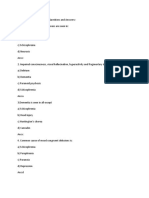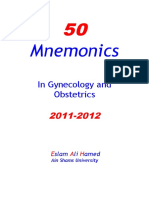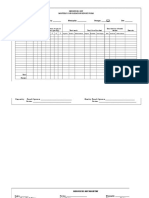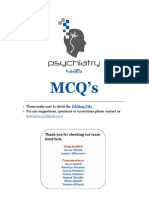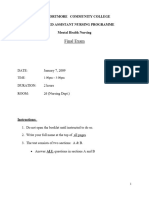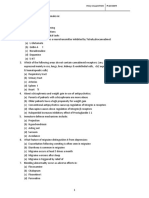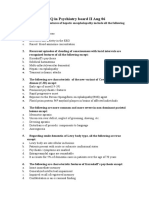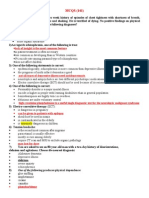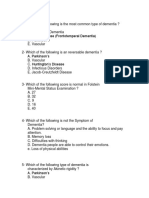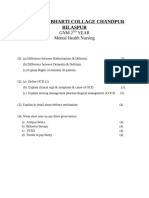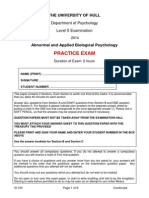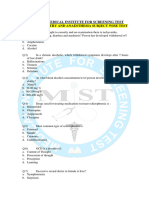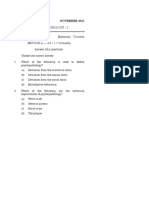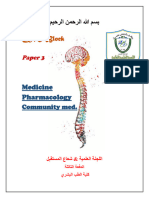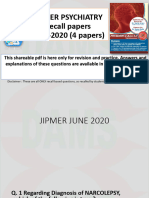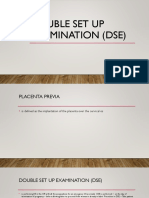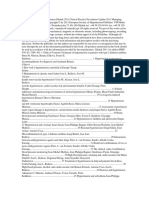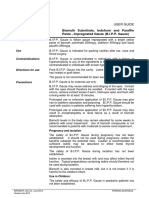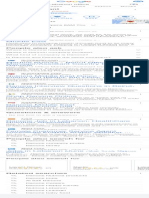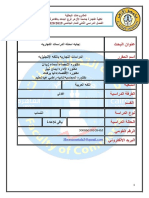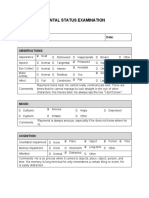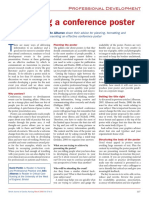0 ratings0% found this document useful (0 votes)
69 viewsMCQS:: A) Imipramine 1 C) Nortriptyline 2 D) Duxepine 3 E) Amitryptaline
MCQS:: A) Imipramine 1 C) Nortriptyline 2 D) Duxepine 3 E) Amitryptaline
Uploaded by
Eyob MizanThis document contains 20 multiple choice questions related to psychiatry. The questions cover topics like drug effects, diagnoses, treatments, and side effects. They assess knowledge of conditions like schizophrenia, depression, anxiety disorders, and substance withdrawal syndromes. Answer choices are also included for each question.
Copyright:
© All Rights Reserved
Available Formats
Download as DOC, PDF, TXT or read online from Scribd
MCQS:: A) Imipramine 1 C) Nortriptyline 2 D) Duxepine 3 E) Amitryptaline
MCQS:: A) Imipramine 1 C) Nortriptyline 2 D) Duxepine 3 E) Amitryptaline
Uploaded by
Eyob Mizan0 ratings0% found this document useful (0 votes)
69 views7 pagesThis document contains 20 multiple choice questions related to psychiatry. The questions cover topics like drug effects, diagnoses, treatments, and side effects. They assess knowledge of conditions like schizophrenia, depression, anxiety disorders, and substance withdrawal syndromes. Answer choices are also included for each question.
Original Description:
,mna.f,.bds,jc
Original Title
MCQs-5
Copyright
© © All Rights Reserved
Available Formats
DOC, PDF, TXT or read online from Scribd
Share this document
Did you find this document useful?
Is this content inappropriate?
This document contains 20 multiple choice questions related to psychiatry. The questions cover topics like drug effects, diagnoses, treatments, and side effects. They assess knowledge of conditions like schizophrenia, depression, anxiety disorders, and substance withdrawal syndromes. Answer choices are also included for each question.
Copyright:
© All Rights Reserved
Available Formats
Download as DOC, PDF, TXT or read online from Scribd
Download as doc, pdf, or txt
0 ratings0% found this document useful (0 votes)
69 views7 pagesMCQS:: A) Imipramine 1 C) Nortriptyline 2 D) Duxepine 3 E) Amitryptaline
MCQS:: A) Imipramine 1 C) Nortriptyline 2 D) Duxepine 3 E) Amitryptaline
Uploaded by
Eyob MizanThis document contains 20 multiple choice questions related to psychiatry. The questions cover topics like drug effects, diagnoses, treatments, and side effects. They assess knowledge of conditions like schizophrenia, depression, anxiety disorders, and substance withdrawal syndromes. Answer choices are also included for each question.
Copyright:
© All Rights Reserved
Available Formats
Download as DOC, PDF, TXT or read online from Scribd
Download as doc, pdf, or txt
You are on page 1of 7
:MCQs
Which of the following has the least -1
:cholenergic effect
a) Imipramine
0
b) Prozac (fluexitine)
c) nortriptyline
1
d) duxepine
2
e) amitryptaline
3
IN BARBITURATE WITHDRAWAL, WHICH OF THE -2
FOLLOWING INDICATES THE WORST PROGNOSIS
a) convulsions
b) hyperthermia
0
c) slurred speech
1
d) anxiety and irritability
2
e) somnolence
3
4
which of the following does not cause dependence -3
a) barbiturates
1
b) diazepam
2
c) buspirone (buspar)
3
d) methadone
4
e) alprazolam (xanax)
5
years old boy very clean with very nice 8 -4
1
clothes, he is meticulous, started to become anxious
with palpitation and apprehension frequently
particularly before exams and at stress times. What is
?your diagnosis
2
a) obsessive compulsive disorder
0
b) anxiety disorder
1
c) schizophrenia
2
d) sexual abuse
3
e) none of the above
4
5- Which of the following is the LEAST common problem
referred to psychiatric evaluation of children ?
a) Aggression
b) Poor peer relationships
c) Temper tantrums
d) School failure
e) Enuresis
1
2
Female chronic schizophrenic on medication. -6
2
Came with abnormal movement in the face involving
?bucco-oral muscles. What to do next
a) Stop the phenothiazines
1
b) decrease the dose of the phenothiazines
2
c) increase the dose of the phenothiazines
3
.d) Stop phinothiazines and give antiparkinsonian drugs
4
e) Start antiparkinsonian drugs
5
Which of the following will benefit most from -7
tricyclic anti-depressants
a) young man with history of social problems
1
b) male 50 ys with features of depression
2
c) male with features of schizophrenia
3
d) female with a relative who has major depressive episode
4
e) female who feels guilty and unhappy
5
6
All of the following are risk of suicide except -8
a) female gender
1
b) male gender
2
c) age
3
d) depression
4
e) physical illness
5
9- In the treatment of manic episodes, which of the
following is LEAST useful in the first three to four
days of treatment?
a) Antipsychotics
b) Lithium ( bec> it needs time to act )
c) Benzodizepine
d) ECT
e) A quit, dimly-lit room to decrease stimulation
0
10- the toxic effect of lithium includes each of the
following EXCEPT:
a) slurred speech
b) coma
c) constipation
d) ataxia
e) nausea and vomiting
all of the following is true for huntington's chorea -11
:EXCEPT
a) onset in mid sixties
1
b) autosomal dominant
2
c) progressive disease
3
d) associated with depression
4
e) associated with dementia
5
which of the following has cross-tolerance with -12
diazepam
a) barbiturates
1
b) cocaine
2
c) alcohol
3
d) haloperidol
4
e) has no cross tolerance
5
the most dangerous withdrawal symptom can be -13
expected from
a) diazepam
1
b) clonazepam
2
c) chlordiazepoxide
3
d) lorazepam
4
e) oxazepam
5
an alcoholic man who was admitted to the hospital -14
because of shaking, increased pulse rate, sweating,
etc. he was also disoriented and with visual
hallucination. The most helpful medication is
a) haloperidol
1
b) chlordiazepoxide(dose 25-50mg) in ICU
2
c) chlordiazepoxide (dose 25-50mg) in the general ward
3
d) chlorpromazine
4
e) phenobarbitone
5
Affect is disturbed in all of the following except -15
a) Dysthymia
1
b) Hebephrenic schizophrenia
2
c) Bipolar disorder
3
d) melancholia
4
e) paranoid delusional psychosis
5
a man with both history of depersonalization and -16
derealisation for 3/12 what do you think
a) normal finding
1
b) give anxiolytic
2
c) needs urgent admission to psychiatric ward to keep him safe
3
d) needs neurological examination before anything
4
e) start psychotherapy
5
a woman complains of sleep disturbance, various -17
aches and pain, inability to experience usual
emotions- (including grief, joy, and pleasure), and she
also complaining of loss o interest. Her family notices
that she became dull, forgetful. On interviewing her
she has decreased concentration, and impaired
?memory. What is your diagnosis
a) Alzheimer disease
1
b) pseudodementia
2
c) multiple personality
3
d) generalized anxiety disorder
4
e) severely depressed
5
75ys man, hypertensive on methyldopa, diuretics -18
and KCl supplement, benzotropine, and vitamins
(including vitamin E), he was brought to the hospital.
The nurse said that he was complaining of sleep
disturbance for the last two days, and impaired
memory, and he was brought now because of
agitation. O/E he was disoriented, and confused,
?which drug is responsible for his confusional state
a) methyldopa
1
b) vitamine E
2
c) benzotropine
3
d) diuretics
4
e) none of the above
5
which of the following conditions, psychotherapy -19
:not indicated
a) phobic disorder
1
b) seasonal affective disorder
2
c)paranoid schizophrenia ( even this answer could be right )
1
d) organic brain syndrome
2
e) bipolar disorder
3
all of the following drugs can cause depression -20
except
a) propranolol
1
b) chlorpromazine
2
c) cimitedine
3
d) levodopa
4
e) methyldopa
5
You might also like
- PSYCHIATRY Multiple Choice Questions and AnswersDocument25 pagesPSYCHIATRY Multiple Choice Questions and AnswersPeter Osundwa Kiteki92% (50)
- Quiz Behavioral ScienceDocument91 pagesQuiz Behavioral ScienceMedShare92% (13)
- Multiple Choice Questions: D) All of The AboveDocument39 pagesMultiple Choice Questions: D) All of The AboveAmit Tamboli100% (6)
- Mnemonics PDFDocument18 pagesMnemonics PDFEyob Mizan88% (8)
- Dengue NS1 RDT Annex 5-6Document4 pagesDengue NS1 RDT Annex 5-6Ga B B Orlongan100% (1)
- Multiple Choice Questions: BSC Nursing Third Year Mental Health NursingDocument9 pagesMultiple Choice Questions: BSC Nursing Third Year Mental Health NursingAmit Tamboli100% (3)
- MCQ'S: Please Make Sure To Check The - For Any Suggestions, Questions or Corrections Please Contact UsDocument12 pagesMCQ'S: Please Make Sure To Check The - For Any Suggestions, Questions or Corrections Please Contact UsBerhanu BeriNo ratings yet
- Psychiatry ExamDocument7 pagesPsychiatry ExamHelen93100% (3)
- Dilution Reconstitution Injection GuideDocument2 pagesDilution Reconstitution Injection GuideSoumabho DasNo ratings yet
- Mcqs PsychiatryDocument27 pagesMcqs Psychiatrypriya009100% (6)
- EAN Exam - LASHANNA - BARNESDocument4 pagesEAN Exam - LASHANNA - BARNESRealGenius (Carl)No ratings yet
- Psychiatry MCQs LJDocument5 pagesPsychiatry MCQs LJAnwaar Yousaf50% (2)
- MCQ Psy Exam Group BDocument17 pagesMCQ Psy Exam Group BsalamredNo ratings yet
- Psychiatry MCQDocument12 pagesPsychiatry MCQMonika Joseph100% (9)
- PsychiatryDocument23 pagesPsychiatryharpalmehanNo ratings yet
- MCQs Psy Exam44 First GroupDocument7 pagesMCQs Psy Exam44 First Groupsalamred100% (3)
- Periasamy Bharathi Sneha-14A (Selfwork - 5)Document4 pagesPeriasamy Bharathi Sneha-14A (Selfwork - 5)Bharathi Sneha PeriasamyNo ratings yet
- MCQ CollectionDocument12 pagesMCQ CollectionTeslim RajiNo ratings yet
- 3e Psychia Bm2 QuestionsDocument15 pages3e Psychia Bm2 QuestionstirthuttekarNo ratings yet
- CII Exa 2024Document10 pagesCII Exa 2024Habesha StylesNo ratings yet
- Psychiatry High Yield NotesDocument6 pagesPsychiatry High Yield Notesgregry2100% (4)
- BBDocument7 pagesBBmomo connor100% (1)
- Revision Test Series - Psychiatry (QNS)Document5 pagesRevision Test Series - Psychiatry (QNS)Suga PriyaNo ratings yet
- AB ? Pre-Board Exam-1Document20 pagesAB ? Pre-Board Exam-1sdfghNo ratings yet
- neuro 60 checked-CopyDocument25 pagesneuro 60 checked-CopytirthuttekarNo ratings yet
- Ch.14 - Q's & KEYDocument9 pagesCh.14 - Q's & KEYSally RiverNo ratings yet
- MCQ in Psychiatry Board II Aug 06 PDFDocument5 pagesMCQ in Psychiatry Board II Aug 06 PDFSpacetoon DaysNo ratings yet
- PM Psychiatry mcqDocument8 pagesPM Psychiatry mcqKiran KuruvillaNo ratings yet
- Psychiatric Nursing PDFDocument2 pagesPsychiatric Nursing PDFأبوأحمد الحكيمNo ratings yet
- Psychiatric NursingDocument2 pagesPsychiatric NursingRn nadeenNo ratings yet
- Psychiatry Exam Questions 1Document4 pagesPsychiatry Exam Questions 1Roxana Mădălina Jojă-AlgeorgeNo ratings yet
- EOP PsyDocument2 pagesEOP PsyFarhana NurNo ratings yet
- 36 Psychiatric SessionalDocument12 pages36 Psychiatric SessionalAmandaTanNo ratings yet
- New ExamDocument19 pagesNew ExamMahmoud SalehNo ratings yet
- All MCQs by DR - RoyalDocument19 pagesAll MCQs by DR - RoyalVaqasFarooqiNo ratings yet
- CNS QuestionsDocument21 pagesCNS QuestionsAhmed MohsenNo ratings yet
- Part A1Document83 pagesPart A1adnan shwNo ratings yet
- EXAMDocument7 pagesEXAMayselibrahimli186No ratings yet
- 2a Neurology Saq QuestionsDocument14 pages2a Neurology Saq Questionsabeerelkady2009No ratings yet
- Chronic Conditions QDocument47 pagesChronic Conditions QahmadranauiNo ratings yet
- neuro 60 (2)Document25 pagesneuro 60 (2)tirthuttekarNo ratings yet
- Not Ans PsychiatryDocument10 pagesNot Ans Psychiatryãhmęð ãĽäãNo ratings yet
- Pediatric AssessmentDocument10 pagesPediatric Assessmentabdokhaled2212No ratings yet
- Gurukul Bharti Collage Chandpur BilaspurDocument3 pagesGurukul Bharti Collage Chandpur Bilaspursk8261810138No ratings yet
- Practice Exam: The University of HullDocument9 pagesPractice Exam: The University of HullSigina DancianuNo ratings yet
- 16 Batch PsychiatryDocument12 pages16 Batch Psychiatryangad.soniv100% (1)
- MBBS-DDS 2K17 Health Care ConceptsDocument7 pagesMBBS-DDS 2K17 Health Care Conceptsreclaim.growth.hope.grit.honour.drNo ratings yet
- 3th Year Residency 2Document17 pages3th Year Residency 2Spacetoon DaysNo ratings yet
- MCQ in Psychiatry Mock PDFDocument18 pagesMCQ in Psychiatry Mock PDFSpacetoon Days100% (3)
- Psychiatry ExamDocument4 pagesPsychiatry Examapi-3703352No ratings yet
- UKZN Schoolof Medicine-Psychiatry Past Paper With Answers & ExplanationDocument7 pagesUKZN Schoolof Medicine-Psychiatry Past Paper With Answers & Explanationjhqmpzg7sjNo ratings yet
- 100 MCQسايكوDocument27 pages100 MCQسايكومشتاقة للجنةNo ratings yet
- Psychiatry MCQ-Answer-Book PDFDocument12 pagesPsychiatry MCQ-Answer-Book PDFWorku Kifle100% (4)
- Tests in Psychiatry-1Document72 pagesTests in Psychiatry-1Javier Saad100% (3)
- Psychiatry and Anaesthesia Test Questions PDF of 15TH October 2022Document19 pagesPsychiatry and Anaesthesia Test Questions PDF of 15TH October 2022zjg64720No ratings yet
- SPSJC51Document6 pagesSPSJC5107 VENOM YTNo ratings yet
- اختبار ورقة 3 Cns الدفعة الثالثةDocument7 pagesاختبار ورقة 3 Cns الدفعة الثالثةHero StoreNo ratings yet
- Soul PNS Theory Exam: The Exam Was 81 Questions 33lecturesDocument10 pagesSoul PNS Theory Exam: The Exam Was 81 Questions 33lecturesAhmad KhassawnehNo ratings yet
- Jipmer Psy 2020-2018 PDF, DR SachinDocument34 pagesJipmer Psy 2020-2018 PDF, DR Sachindraxthedestroyer08No ratings yet
- Amc Psychiatric 2005 To 2009Document28 pagesAmc Psychiatric 2005 To 2009Sindu Sai100% (1)
- 4th Year Residency 1Document17 pages4th Year Residency 1Spacetoon DaysNo ratings yet
- Development of ComputerDocument4 pagesDevelopment of ComputerEyob MizanNo ratings yet
- IT AssignementDocument6 pagesIT AssignementEyob MizanNo ratings yet
- Application Letter: ApplicantDocument1 pageApplication Letter: ApplicantEyob MizanNo ratings yet
- Double Set Up Examination (DSE)Document4 pagesDouble Set Up Examination (DSE)Eyob Mizan100% (1)
- Contraception Family PlaningDocument74 pagesContraception Family PlaningEyob MizanNo ratings yet
- Assigment It 1Document4 pagesAssigment It 1Eyob MizanNo ratings yet
- Lecture Notes On AphDocument41 pagesLecture Notes On AphEyob MizanNo ratings yet
- New Born ClassificationDocument47 pagesNew Born ClassificationEyob MizanNo ratings yet
- Methods of Family PlanningDocument46 pagesMethods of Family PlanningEyob MizanNo ratings yet
- Pelvic Inflammatory Disease (PID) : Basim Abu-RafeaDocument26 pagesPelvic Inflammatory Disease (PID) : Basim Abu-RafeaEyob MizanNo ratings yet
- Citizenship: Social Studies OnlineDocument12 pagesCitizenship: Social Studies OnlineEyob MizanNo ratings yet
- Fits e 11111111111Document209 pagesFits e 11111111111Eyob MizanNo ratings yet
- Abnormal Larour 3Document135 pagesAbnormal Larour 3Eyob MizanNo ratings yet
- States of Consciousness: Psychology: An Introduction Charles A. Morris & Albert A. Maisto © 2005 Prentice HallDocument39 pagesStates of Consciousness: Psychology: An Introduction Charles A. Morris & Albert A. Maisto © 2005 Prentice HallEyob MizanNo ratings yet
- Admission Guidelines For Fall Semester 2024Document9 pagesAdmission Guidelines For Fall Semester 2024Bekzod ErgashevNo ratings yet
- 2022 NEJM Bataller Arab ShahDocument13 pages2022 NEJM Bataller Arab ShahFrancisca González RoccoNo ratings yet
- BP 201 A PSDocument2 pagesBP 201 A PSCharlesNo ratings yet
- 1507 FullDocument2 pages1507 FulljustinbrkovicNo ratings yet
- Safety Data Sheet: Tokyo Chemical Industry (India) Pvt. LTDDocument5 pagesSafety Data Sheet: Tokyo Chemical Industry (India) Pvt. LTDkarthiche05No ratings yet
- Pta 2540 Case Study Amputation and Diabetes - Jade ClawsonDocument3 pagesPta 2540 Case Study Amputation and Diabetes - Jade Clawsonapi-317395769No ratings yet
- Internal Podalic Version For Neglected Shoulder Presentation With Fetal DemiseDocument4 pagesInternal Podalic Version For Neglected Shoulder Presentation With Fetal DemiseErlangga DayudNo ratings yet
- Certificate of Analysis For Sample No. BC-21-CS-22835 v1Document3 pagesCertificate of Analysis For Sample No. BC-21-CS-22835 v1rioga17No ratings yet
- Introduction To Nursing ResearchDocument136 pagesIntroduction To Nursing ResearchMohammed AbdelaNo ratings yet
- Intrauterine Devices (IUD) ContraceptionDocument17 pagesIntrauterine Devices (IUD) ContraceptionVitrosa Yosepta SeraNo ratings yet
- Bip03051f UgDocument2 pagesBip03051f UgdellalalaNo ratings yet
- Trial Penang SPM 2013 BIOLOGY K1 K2 K3 SKEMA (SCAN)Document0 pagesTrial Penang SPM 2013 BIOLOGY K1 K2 K3 SKEMA (SCAN)Cikgu FaizalNo ratings yet
- AFMC MBBS BrochureDocument21 pagesAFMC MBBS BrochureAnweshaBoseNo ratings yet
- Phieu Chuyen AnhDocument7 pagesPhieu Chuyen AnhMinh HiếuNo ratings yet
- Subdural HematomaDocument8 pagesSubdural HematomaaaronmanullangNo ratings yet
- PHE 9th Grade Lesson NOTEDocument12 pagesPHE 9th Grade Lesson NOTENnia ManiNo ratings yet
- Psychiatric-Mental Nursing AssessmentDocument13 pagesPsychiatric-Mental Nursing AssessmentSolsona Natl HS MaanantengNo ratings yet
- Irene Diamond TKR Brochure-PrintDocument39 pagesIrene Diamond TKR Brochure-PrintTusan Sidharta100% (1)
- Readingpracticetest1 v9 2549671Document14 pagesReadingpracticetest1 v9 2549671hang.transpa33bNo ratings yet
- Danone Levant: Danone Lebanon o CeDocument1 pageDanone Levant: Danone Lebanon o CeSamer GhneimNo ratings yet
- FinmathmoduleDocument10 pagesFinmathmoduleJani ThorNo ratings yet
- الدراسات التجاريه باللغه الإنجليزيه 30006010108465Document9 pagesالدراسات التجاريه باللغه الإنجليزيه 30006010108465Soliman OsamaNo ratings yet
- Assemblywoman Felicita G. Bernardino Memorial Trade SchoolDocument14 pagesAssemblywoman Felicita G. Bernardino Memorial Trade SchoolGabriel B IgnacioNo ratings yet
- Mental Status ExaminationDocument2 pagesMental Status ExaminationJoyce EguiaNo ratings yet
- Gr11 Population-Ecology MEMODocument4 pagesGr11 Population-Ecology MEMOchulumancokolelaNo ratings yet
- Jennieinchausti Case Study Spede 777Document21 pagesJennieinchausti Case Study Spede 777api-242067563No ratings yet
- Acetate PathwayDocument25 pagesAcetate PathwaySangga Buana KomaraNo ratings yet
- Preparing A Conference Poster: Professional DevelopmentDocument4 pagesPreparing A Conference Poster: Professional DevelopmentKeith PohlNo ratings yet
